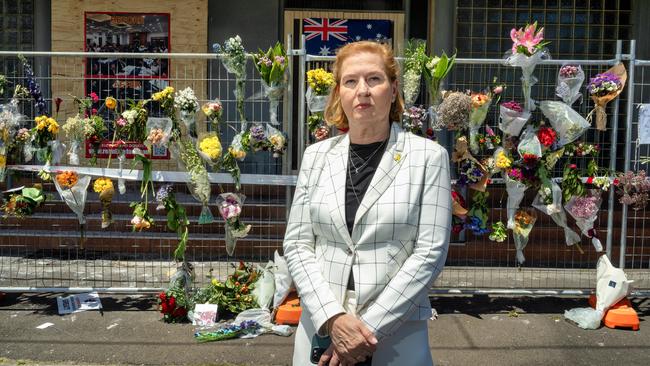Former Israeli foreign minister Tzipi Livni says ‘governance’ the key to combating anti-Semitism
Speaking while paying her respects at the burnt-out Adass Israel Synagogue, Tzipi Livni says the war against anti-Semitism begins with just one word.

A former Israeli foreign minister says the war against anti-Semitism begins with just one word: leadership.
Tzipi Livni says societies that do not have strong political leadership ready to stamp out anti-Semitism as soon as it occurs will never be able to conquer the scourge.
Ms Livni, Israel’s foreign minister from 2006-09 and also a former vice-prime minister and justice minister, was speaking as she paid her respects at the burnt-out Adass Israel Synagogue in Melbourne after it was firebombed in the early hours of last Friday.
Ms Livni stressed she was not passing comment or judgment on the Australian government and said she did not want to wade into a domestic political debate. But she said her observation was that the rise in anti-Semitism in the Western world since October 7, 2023 demanded strong responses from governments to stop it festering and spreading.
“Responsibility lies with the leadership of the countries where it is rearing its ugly head,” Ms Livni said. “Because it’s not just about the Jews or the state of Israel. It’s about the society itself, and the nature of the society and hate speech.
“Anti-Semitism needs to be dealt with strongly by the political leadership of any country.”
She said a clear message that such behaviour will not be tolerated also needed to be backed up by a raft of concrete measures.
“From my experience, it’s about education to promote tolerance. It’s about legislation, about giving hate crimes a different punishment because it means something more. It is also about the public messages coming from leaders to say that this is not accepted there, and will not be tolerated.
“It’s about investing in that message and continuing to monitor it carefully.”
Ms Livni, visiting Australia with the Scopus Foundation, said a key factor of anti-Semitism since the October 7, 2023 Hamas attacks on Israel was that protesters were deliberately blurring the line between legitimate protest against Israeli government policies and anti-Semitic calls for the destruction of Israel.
“I want to make it clear: there’s a difference between anti-Semitism and legitimate criticism of Israeli government policy, there’s a line between these two,” she said.
“I myself was the leader of the opposition (in Israel) and the fact is that you can criticise government policy. But when it comes to undermining the right of Israel to defend itself, or the right of Israel to exist as a Jewish state, these are pillars for the existence of the country as the nation state.
“For example, by chanting ‘from the river to the sea’ you are doing so at the expense of the state of Israel.”
Ms Livni, a political centrist who was Israel’s chief negotiator for peace with the Palestinians during the last two rounds of negotiations, said that although the notion of a two-state solution was still ultimately a laudable aim, the realities on the ground now made such an outcome impossible in the short term.
That is one of the reasons she did not agree with the sweeping UN resolution passed last week – with Australia’s support – that called for the “rapid” withdrawal of Israel from the Palestinian occupied territories.
Ms Livni said it was “not the right resolution” because it did not refer to “the realities on the ground”. She said passing such resolutions only served to “strengthen extremists of both sides” because they say “we don’t have to compromise in future negotiations” because the UN is moving with us already.








To join the conversation, please log in. Don't have an account? Register
Join the conversation, you are commenting as Logout